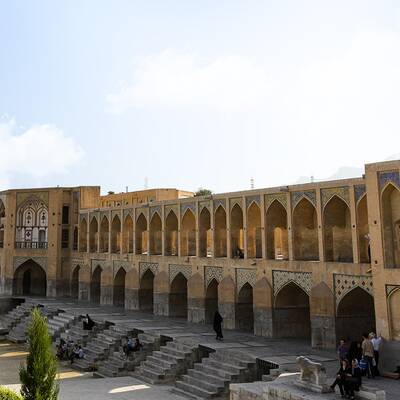Atashgah Fire Temple is located on a rocky hill with 100 meters height in the Marbin district of Isfahan, three kilometers south of Khomeini Shahr, eight kilometers west of Isfahan and near Zayandeh Rud.
Atashgah Fire Temple is an adobe structure made of red clay in the form of 40 centimeters in 40 centimeters squares putting on each other built the foundation and walls of the building. There is a layer of straw between each two layers of adobe that has made it more durable along with history.
The method of arranging adobes in the jagged walls is called “Hasht o Gir”. The walls are balanced. In the north part of the construction there seen some rooms interconnected. The size of some adobes are 20 centimeters in 20 centimeters. Also, there is a tower in the highest part of the stone hill, still remained in the north of the structure that is octagonal from inside and round from outside. There are doorways in all sides of the tower and also in the rooms.
Jane Dieulafoy, the French archaeologist, visited this fire temple in 1882 and he estimated the structure to had a dome in the past. He also reported the traces of an abandoned house close to the temple and a fortress built of square adobes with 40 centimeters diameter around them.
William Jackson, the American linguist, reported in 1903 some potteries and bricks made of yellow clay, reliefs and a Sarooj base that had been the place of Atashgah. Tavernier, Chardin, ker Porter and Godard also reported this fire Temple. Sadeq Hedayat wrote in 1311: “if this building had not been ruined by human, it could live even for another 100 years”.
Several historian and geologists in the Middle Ages mentioned to the fortress of Mehrin fire temple that was called Marbin. Al-Baladhuri referred to Marbin fortress, too. Ibn Rustah attributes the reconstruction of building to Bahman Pour Esfandiar. Masoudi speaks about the tendency of Zoroastrians to this building and Ibn Hawqal and Mafroukhi confirm it is being a fire temple. Ibn Esfandiar reported the Ismailian’s attempts in this building in the Middle Ages.
The newer research shows that Marbin Fortress was first built and the Atashgah fire temple was later built inside it. The Parthian potteries around the walls relate the building to the Parthian period. In addition, it is noteworthy that the Sassanid fire temples were mostly built of stone not adobe!












-khoshfetrat-main.jpg)